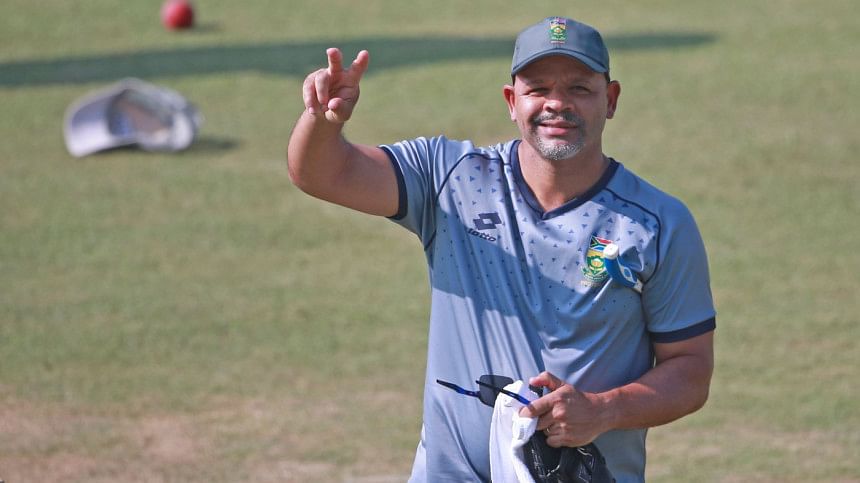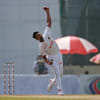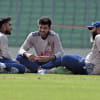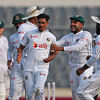‘We try not to focus too much on history’

Former South Africa captain Ashwell Prince is currently working as the batting coach of his country. The 47-year-old had previously worked with Bangladesh as a batting consultant from August 2021 to February 2022, but resigned from his position with nine months still left on his contract. On Monday, before South Africa's final training session in Chattogram ahead of their second Test against hosts Bangladesh, Prince talked to The Daily Star's Samsul Arefin Khan. The excerpts of the interview are as follows:
The Daily Star (DS): This South Africa side is relatively younger to the ones that have toured Bangladesh before. How do you see their growth as a unit?
Ashwell Prince (AP): It's a young team in terms of Test cricket. But if you look at the experience they have as cricketers, they aren't that young. They haven't toured the sub-continent a lot and they haven't been to Bangladesh before. But they have been around first-class and professional cricket for a long time. We try to use all of that experience and plug it into the situation we are facing. It's an exciting group of young batters. Obviously, they have grown up in different circumstances as there are a lot of T20s these days. So there are a lot of younger generation batters who like to be positive and play their game which is nice to see.
DS: On a hostile wicket in Mirpur, your batting unit performed brilliantly in the first Test, which helped your side win their first Test in Asia in 10 years. How satisfied are you with their performance?
AP: There are a few factors that we are encouraged about. Kyle Verreynne played really well and scored his second Test hundred. Mulder played really well, scoring his highest Test score. Obviously, at some stages of the innings, we were under pressure. But the way the guys reacted under pressure, that's really encouraging. David Piet scored some vital runs in the latter part of the innings as well. All runs are important, doesn't matter where it comes from – upfront or later in the innings. Then of course in the second innings, Tony de Zorzi batted really well until he lost his wicket. So, that's really encouraging, seeing how the young guys are going.
DS: How did you prepare the batters for this series, where you would play two Tests on two very different surfaces in Dhaka and Chattogram.
AP: The preparation was very much the same. The guys focused on their strengths, they focused on how to score runs rather than to survive. So that's been the focus. We knew that Mirpur will be a certain challenge. We have been here before on this ground as well. We know that the challenge might be different. Having said that, every batting innings starts on zero for every individual. When you start your innings, you have to assess the condition and see what you are able to do in those particular conditions. So, we try not to focus too much on history. Of course, we take that into consideration. But you know you can play on the same ground today and you come to play on the same ground next week and the pitch can be different. So we try to focus on today's pitch, what it's doing now and how I can adapt to the situation rather than getting too many preconceived ideas like it's going to do this or it's going to do that. I think when you are focused on the pitch doing all sorts of things, it clouds your mind and you don't have the clarity. I think what we try to do is focus on assessing the condition on the day and adapting to those conditions.
DS: Is playing in Bangladesh a good way to prepare for future tours in other countries in the sub-continent?
AP: Yes, absolutely. I think the more they get to play on different continents, different grounds, different conditions, they are able to take that experience and pack it in a bag. The next time when they come to similar weather conditions, pitch conditions, they are able to use those as reference points, 'What did I do when I was there, things that I did that were really good for me, I can maybe use it in the future.' Saying that, again I emphasise, you come next week, you play on a new pitch, you have to assess the new pitch because it could be different from what the history says.
DS: After the win, South Africa are currently fifth in the World Test Championship standings. How do you view your chances of playing the final?
AP: Obviously, winning a Test match had a positive effect on our position. We moved up a few places. But then New Zealand won [against India] and they went ahead of us again. So, that will always change as long as the matches keep happening. But from our point of view, we want to keep ourselves in a position where it is in our hands. We want to be able to depend on ourselves. So, if we win our matches we have a chance. We don't want to be dependent on other matches or to be waiting for this result to happen or that result to happen, because we need a favour. At the moment we want to keep things as much as possible in our own control. And that means we have do our best to try and win our matches.
DS: Kyle Verreynne and some others used sweeps and reverse-sweeps to good effect in the first Test. Is that part of South Africa's strategy to counter the Bangladesh spinners?
AP: These players have grown up with all three formats: four-day cricket, 50-over cricket, T20 cricket. And across all three formats, as you are growing up, 19, 20, 21 to the ages where they are now, mid to late 20s, you have grown and developed a big skill set. And at the end of the day, when you are going to the middle, you have to express your skill set. And if it means, sweep, if it means reverse sweep, it's not as if they are doing it because they have no other options. Those are the things that they are good at and we try to encourage the batsmen to play to their strength. Everybody's strength is different. Kyle Verreynne is very good at sweeping may be another player prefers not to sweep. We encourage the players to play according to their strengths.
DS: How much have the Bangladeshi batters progressed since you left, what are your thoughts on their recent struggles?
AP: I think it's a little bit harsh to say they are struggling. We respect the Bangladesh team highly. They have just come from a tour in Pakistan where they were successful, historic win for Bangladesh and obviously they scored a lot of runs there. Batting is hard, I think people need to understand that batting is hard. Sometimes fans want massive performances every game. It's not always possible. From our point of view, we respect the Bangladesh team and their batting lineup. We know what they have been doing recently. We know they can be dangerous. That's what we have prepared for. We have prepared for them to play well, and hopefully, we can play a little bit better.

 For all latest news, follow The Daily Star's Google News channel.
For all latest news, follow The Daily Star's Google News channel. 








Comments